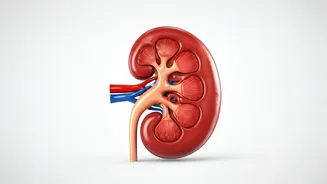Early Morning Hydration
Starting your day with adequate hydration is crucial for kidney health, but the timing and type of fluids matter. According to urologists, not drinking
enough water early in the morning can lead to a build-up of waste products in the kidneys, potentially causing damage over time. Consider drinking a glass or two of water as soon as you wake up. This helps flush out toxins that accumulated overnight. Avoid overdoing it with sugary drinks or caffeinated beverages, as these can have diuretic effects, causing your body to lose water and hindering kidney function. Prioritize plain water or herbal teas to support optimal kidney health, and establish a consistent routine to maintain healthy hydration levels throughout the day.
Skipping Your Breakfast
Many people often overlook the impact of skipping breakfast, but it can negatively influence kidney health. Skipping your morning meal can disrupt the body's metabolic processes and place undue stress on your kidneys. A well-balanced breakfast provides essential nutrients that support overall health, including kidney function. When you skip breakfast, your body might break down muscle tissue to get the energy it needs, resulting in a surge of waste products that kidneys have to filter. Eating a nutritious breakfast with proteins, carbohydrates, and healthy fats helps stabilize blood sugar levels, preventing sudden spikes or drops that can affect kidney health. Ensure you include complex carbohydrates, lean proteins, and healthy fats in your breakfast, which will help keep your kidneys in top shape and improve your overall well-being.
Painkiller Intake Habits
Another potentially harmful morning habit is reaching for painkillers, which can have significant consequences for your kidneys. Excessive or frequent use of over-the-counter painkillers, such as ibuprofen or naproxen, can impair kidney function, particularly when taken on an empty stomach. These medications can restrict blood flow to the kidneys, leading to inflammation and damage. If you frequently rely on painkillers to manage morning aches or headaches, consider consulting a healthcare professional to find alternative solutions. These could include physical therapy, lifestyle adjustments, or other pain management strategies that do not put your kidneys at risk. If you have to take painkillers, take them as directed, and avoid combining them with alcohol or other medications that could further burden your kidneys.
Excessive Caffeine Consumption
Starting your day with too much coffee or other caffeinated beverages could potentially affect kidney health. High caffeine intake can increase blood pressure, which can strain the kidneys and increase the risk of kidney damage. Caffeine acts as a diuretic, increasing urine production, which can cause dehydration if fluid intake isn't sufficient. Dehydration can reduce blood flow to the kidneys, impairing their ability to function correctly. If you're a heavy caffeine consumer, consider moderating your intake, and balance it with plenty of water throughout the morning. Opting for herbal teas or diluted coffee can provide a less intense caffeine boost, along with the health benefits of staying well-hydrated. Monitoring your caffeine intake and staying adequately hydrated helps to safeguard your kidney function.
Holding Back Urination
Resisting the urge to urinate in the morning is a habit that can have severe implications for kidney health. Holding urine for extended periods can increase pressure in the bladder and kidneys. This pressure can cause urine to back up into the kidneys, leading to potential infections and damage. It can also weaken the bladder muscles over time, causing incontinence issues. Make a point of going to the bathroom when you first feel the urge, and establish a regular urination schedule throughout the day. Listen to your body's signals, and avoid delaying urination, even if you are busy or occupied. Maintaining a healthy bladder routine is vital for preventing problems with your kidneys and overall urinary health, ensuring your kidneys' optimal performance.













